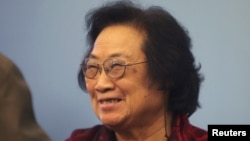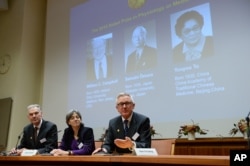For decades, China has yearned for a Nobel Prize in one of the sciences, and now a little-known researcher who helped isolate an anti-malaria medicine derived from an ancient remedy has finally won China that honor.
Tu Youyou (pronounced "TOO yoyo"), 84, also became the country's first woman to win any Nobel prize.
Tu never achieved much public acclaim in China for her part in the early 1970s discovery, and never was accepted into the country's prestigious national academy of science despite several attempts. But her breakthrough with the Nobel has drawn jubilant congratulation, sent her name trending on social media and drawn praise for the country's medical research.
Premier Li Keqiang congratulated Tu for winning the award, as did Vice Premier Liu Yandong, in charge of China's education, science and research.
Tu appeared on state broadcaster CCTV to say the award was a "great honor" while declining to take all of the credit for her work in discovering artemisinin and dihydroartemisinin, extracted from sweet wormwood (Artemesia annua).
"The successful finding of artemisinin is the collective achievement of the research team, and it is a collective honor for all Chinese scientists," Tu said. "It indicates that the research science of the Chinese traditional medicine have won high attention from the internal science community. It is an honor for China and also an honor for Chinese scientists."
As a junior researcher, Tu was recruited by the Chinese government to work on a military project in 1969 to find anti-malaria drugs.
Tu and her teammates combed through ancient medicine books, herbal therapies and folk remedies before they compiled 640 medical treatments.
Tu and her team conducted research on more than 200 of the herbal medicines and later focused on sweet wormwood -- a remedy cited originally in a Chinese text by the 4th Century pharmacist Ge Hong.
They found that a compound extracted from the wormwood was effective in treating malaria.





